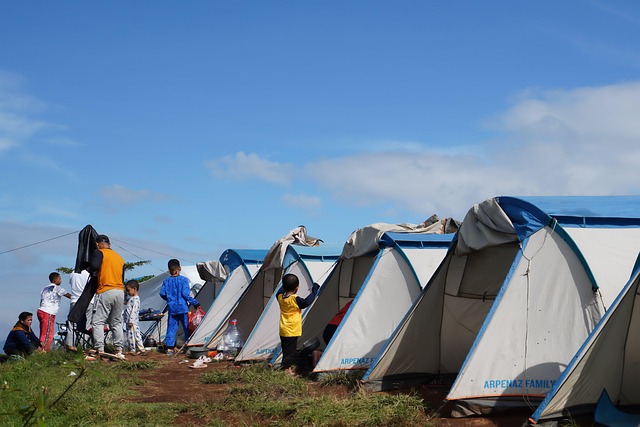Lakeside campgrounds offer an eco-conscious outdoor escape with natural beauty and sustainable practices. Adopting green initiatives like solar power, recycling, and water conservation, these camps protect ecosystems while providing serene surroundings for hiking and swimming. Through education and responsible waste management, visitors contribute to nature preservation and gain a deeper connection to the environment.
“Discover the ultimate eco-friendly escape with our guide to sustainable camping practices. From choosing serene Lakeside campgrounds that minimize environmental impact, to exploring green initiatives in infrastructure and recycling programs, this article covers it all. Learn how wildlife conservation efforts and educational programs enhance your outdoor experience while preserving nature’s beauty. Embrace a responsible approach to camping and contribute to a healthier planet with these practical tips.”
- Choosing Lakeside Campgrounds for Eco-Conscious Getaways
- Sustainable Practices: Reducing Environmental Impact
- Green Initiatives in Camping Infrastructure
- Recycling and Composting: A Key to Sustainability
- Encouraging Wildlife Conservation at Campsites
- Educating Campers on Eco-Friendly Living
Choosing Lakeside Campgrounds for Eco-Conscious Getaways

For an eco-conscious escape, consider opting for lakeside campgrounds that offer a unique blend of natural beauty and sustainable practices. These camps are often nestled along pristine water bodies, providing a serene environment for visitors while minimizing their ecological footprint. Lakeside settings not only offer breathtaking views but also encourage responsible outdoor recreation, such as hiking, swimming, and fishing, reducing the need for energy-intensive activities.
Many lakeside campgrounds adopt sustainable practices like recycling programs, solar energy use, and water conservation measures. They may also provide educational opportunities for visitors on topics like native wildlife habitat preservation and responsible waste management. By choosing these eco-friendly options, campers can contribute to the protection of delicate ecosystems and enjoy a more meaningful connection with nature.
Sustainable Practices: Reducing Environmental Impact

Lakeside campgrounds are embracing sustainable practices to minimize their environmental impact, setting a new standard for eco-friendly getaways. One key area of focus is waste management, where many campgrounds now offer comprehensive recycling and composting programs, encouraging guests to reduce their carbon footprint.
These initiatives extend to energy conservation, with some lakefront campgrounds generating their own renewable power through solar panels or wind turbines, while others implement efficient lighting systems and smart thermostats to cut down on electricity usage. Additionally, lakeside campgrounds are prioritizing water conservation by installing low-flow fixtures and promoting responsible water usage among visitors, ensuring that these natural wonders remain pristine for future generations to enjoy.
Green Initiatives in Camping Infrastructure

Many lakeside campgrounds are embracing green initiatives, incorporating sustainable practices into their infrastructure and operations. This shift is evident in several key areas, such as renewable energy sources, efficient waste management systems, and eco-friendly building materials. Some campgrounds are harnessing solar power to reduce their carbon footprint, while others use wind energy or hydroelectric generators for electricity needs.
In terms of waste reduction, these lakeside campgrounds implement recycling programs, compost food scraps, and encourage guests to minimize disposable items. They may also offer accessible public restrooms and showers that utilize water-saving fixtures. Additionally, the construction of new facilities often incorporates natural ventilation and lighting, reducing reliance on artificial cooling and lighting systems. These green initiatives not only protect the surrounding environment but also provide a more sustainable and enjoyable experience for campers.
Recycling and Composting: A Key to Sustainability

Recycling and composting are integral components of sustainable practices at eco-friendly lakeside campgrounds. By implementing these programs, campgrounds can significantly reduce their environmental impact. Recycling allows for the reuse of materials like plastic bottles, aluminum cans, and paper products, diverting them from landfills and conserving natural resources. On-site composting initiatives further enhance sustainability by turning organic waste into nutrient-rich soil amendments, fostering a healthier ecosystem.
Lakeside campgrounds that embrace these practices not only contribute to a cleaner environment but also set an example for visitors. Educating campers on proper recycling and composting techniques encourages responsible behavior that extends beyond the campground fences. Such initiatives promote a culture of environmental stewardship, ensuring that future generations can continue to enjoy the beauty of nature without compromising its health.
Encouraging Wildlife Conservation at Campsites

Many lakeside campgrounds are actively contributing to wildlife conservation efforts, creating harmonious outdoor experiences. By implementing eco-friendly practices, these campgrounds ensure that visitors can enjoy the beauty of nature while minimizing their impact on local ecosystems. One effective strategy is maintaining natural habitats around the campsite, allowing animals to flourish. This involves restricting access to certain areas, preventing the destruction of vegetation that serves as wildlife habitats.
Additionally, lakeside campgrounds promote conservation by educating campers about the importance of preserving biodiversity. They organize programs and workshops, teaching visitors how their actions can positively influence the surrounding environment. For instance, proper waste management techniques, such as recycling and composting, are encouraged to reduce pollution. These practices not only benefit wildlife but also foster a deeper connection between campers and nature, inspiring them to protect our planet’s precious resources.
Educating Campers on Eco-Friendly Living

Many eco-friendly campgrounds prioritize education as a key component of their sustainable practices. By offering workshops and informative sessions, campers can learn about minimizing their environmental impact during their stay. This includes simple yet effective methods like proper waste disposal, water conservation, and energy-saving tips for camping.
For Lakeside campgrounds, this might involve teaching campers about the unique aquatic ecosystem and how to protect it through responsible activities like fishing and swimming. Educating visitors on sustainable living ensures they leave with a deeper understanding of their connection to nature and a commitment to preserving the environment for future generations of campers to enjoy.
